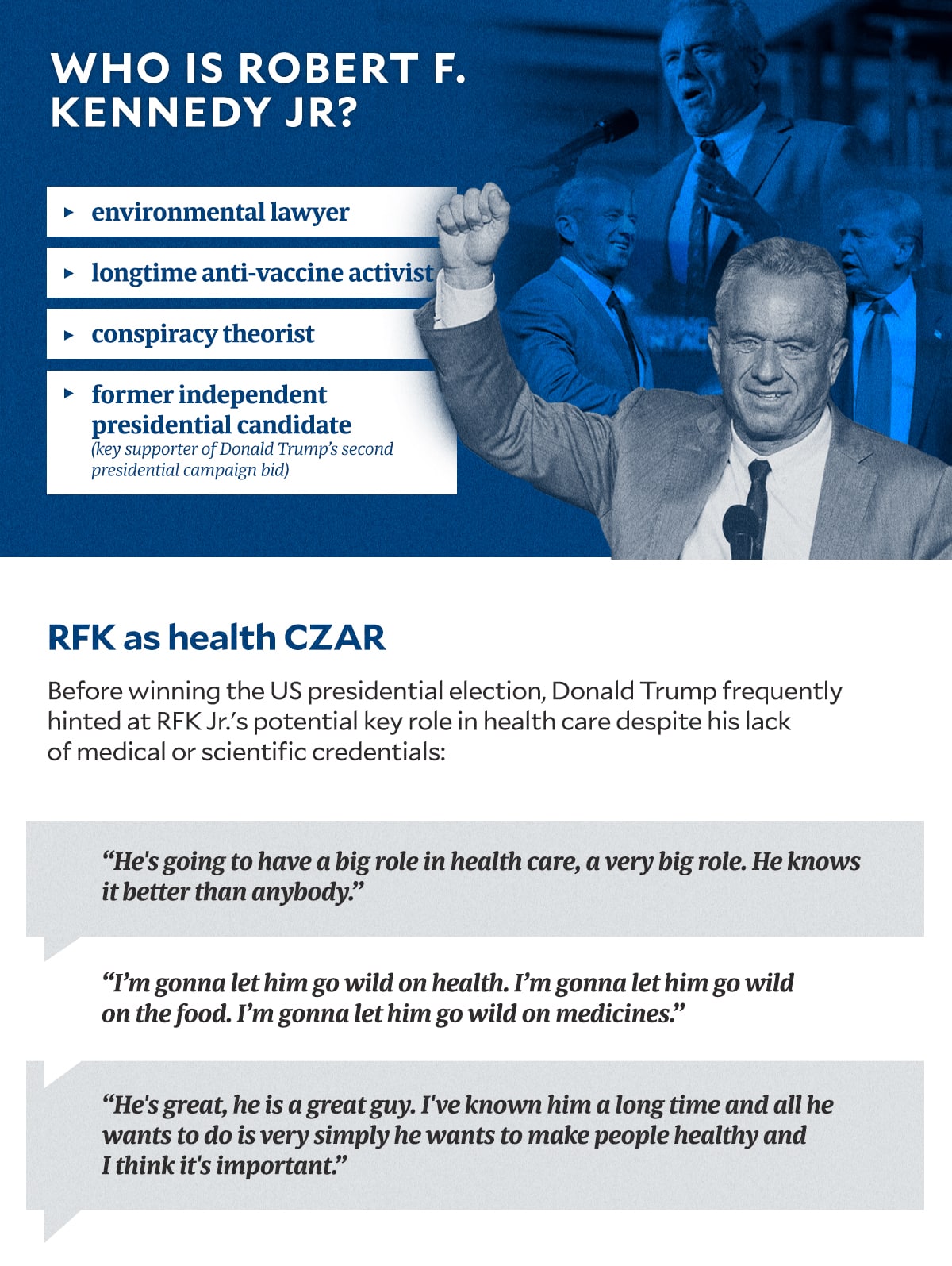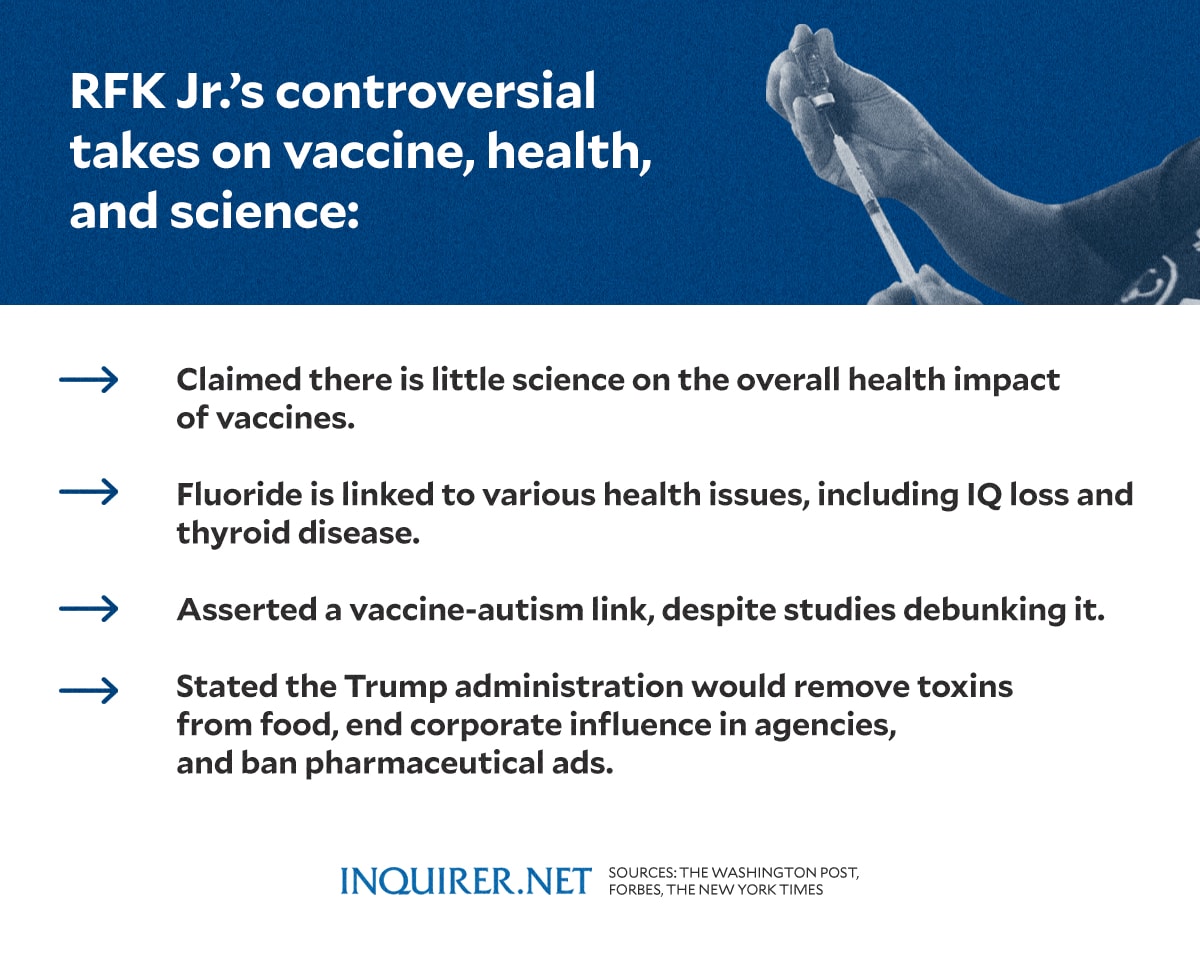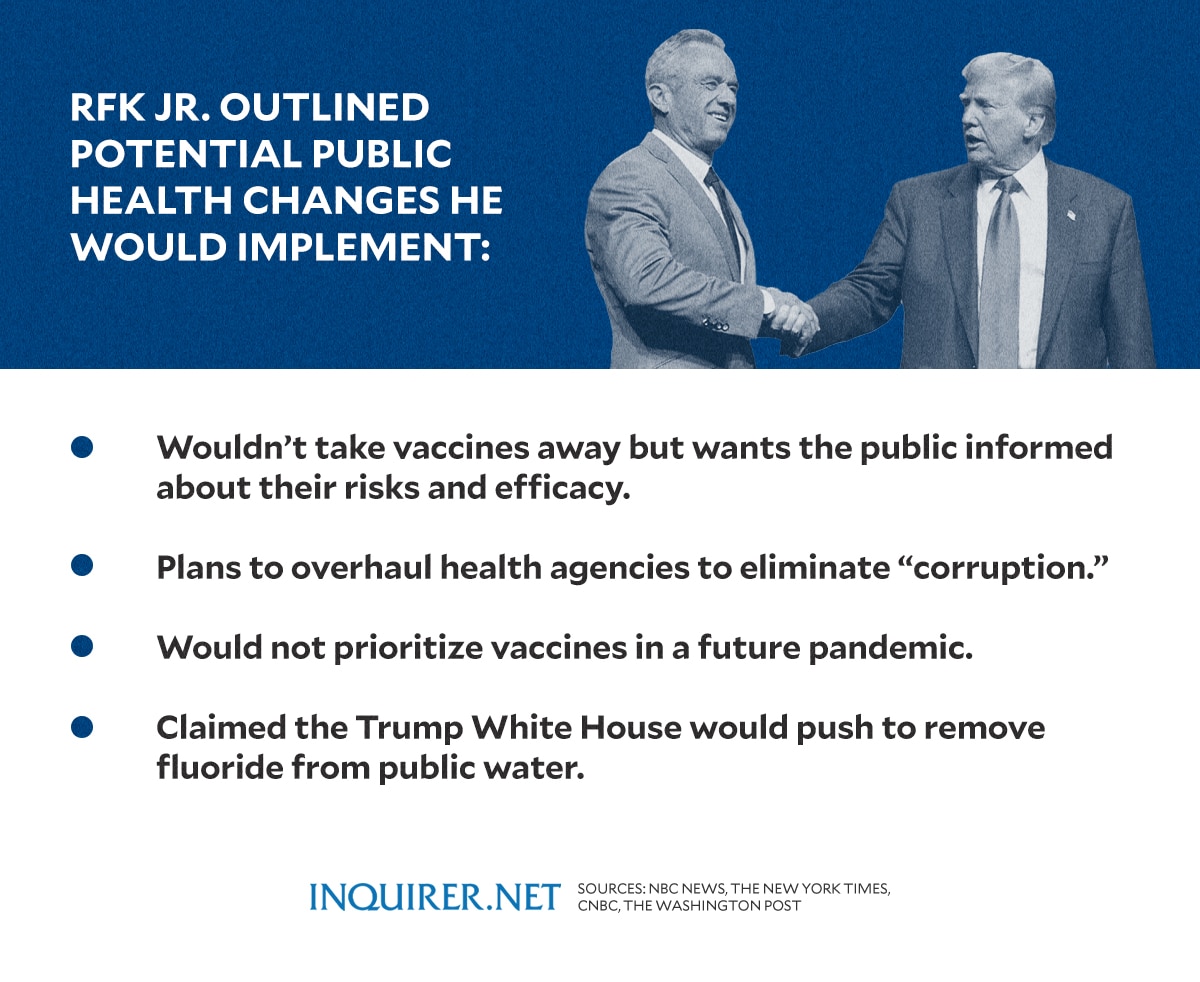DONALD TRUMP composite image from Inquirer file and AP file photos
(Last of two parts)
MANILA, Philippines—With Donald Trump securing his second term as US president, his anticipated policy shifts in health care have drawn global attention, particularly his nomination of Robert F. Kennedy Jr. to lead the Department of Health and Human Services (HHS).
On November 14 (US time), Trump officially picked Kennedy as his health and human services secretary, adding the renowned anti-vaccine campaigner to his growing controversial Cabinet roster.
“I am thrilled to announce Robert F. Kennedy Jr. as The United States Secretary of Health and Human Services (HHS). For too long, Americans have been crushed by the industrial food complex and drug companies who have engaged in deception, misinformation, and disinformation when it comes to public health,” Trump wrote on his social media platform, Truth Social.
“The Safety and Health of all Americans is the most important role of any Administration, and HHS will play a big role in helping ensure that everybody will be protected from harmful chemicals, pollutants, pesticides, pharmaceutical products, and food additives that have contributed to the overwhelming Health Crisis in this Country,” the president-elect said.
Article continues after this advertisement
“Mr. Kennedy will restore these Agencies to the traditions of Gold Standard Scientific Research, and beacons of Transparency, to end the Chronic Disease epidemic, and to Make America Great and Healthy Again!” he added.
Article continues after this advertisement

GRAPHIC Ed Lustan
Despite Trump’s official nomination, many key appointments in his Cabinet, including Kennedy’s, must undergo additional vetting. Several of these positions require a Senate hearing and majority approval from the chamber.
If confirmed, Kennedy would oversee major health agencies, including the Centers for Disease Control and Prevention (CDC), the National Institutes of Health, the Centers for Medicare and Medicaid Services, and the Food and Drug Administration (FDA).
Known for his anti-vaccine stance and advocacy of various health-related conspiracy theories, Kennedy’s anticipated role as a health czar is stirring anxiety, with public health experts both within and beyond the US concerned about the global ramifications — especially for nations like the Philippines, which rely heavily on US-provided health aid and vaccine support.
Trump’s global health stance: A mixed outlook for PH
In the first part of this report, health officials and analysts weighed in on how Trump’s return could affect US foreign health aid, a key lifeline for Philippine health initiatives.
As the Philippines’ largest health donor, the US, primarily through USAID, has played a central role in supporting immunization programs, combating infectious diseases, and providing critical health resources to underserved communities in the Philippines.
Despite Trump’s history of prioritizing “America First” policies, local experts and government officials were optimistic that this longstanding partnership in health assistance would remain resilient.
In the past years, Philippine health authorities under the Department of Health (DOH) have noted the invaluable support from US aid in recent years, particularly during the COVID-19 pandemic, when millions of vaccine doses reached the Philippines through US programs.
READ: PH gets nearly 4M doses of Pfizer COVID-19 vaccines from US
While the Philippine government has voiced hope that collaborative efforts would continue under Trump’s administration, a new concern looms on the horizon: the appointment of Kennedy as a central figure in US health policy.
READ: Who will staff Trump’s government? A look at top contenders

GRAPHIC Ed Lustan
During his campaign, Trump repeatedly suggested that Kennedy, despite having no medical or scientific background, would wield significant influence over US health care.
“He’s going to have a big role in health care, a very big role. He knows it better than anybody,” Trump said during a campaign stop in Dearborn, Michigan.
Trump continued to underscore Kennedy’s potential impact. “I’m gonna let him go wild on health. I’m gonna let him go wild on the food. I’m gonna let him go wild on medicines,” the president-elect stressed.
He also described Kennedy as a close ally, saying, “He’s great, he is a great guy. I’ve known him a long time, and all he wants to do is very simply he wants to make people healthy, and I think it’s important.”
RFK Jr.’s controversial public health opinion
An environmental lawyer and prominent vaccine skeptic, Kennedy has made several statements that have raised concerns among public health experts. Although he has publicly denied being an anti-vaccine advocate, news outlets have debunked this claim, highlighting his past and recent anti-vaccine remarks.
An investigation by The Associated Press (AP) last year uncovered that Kennedy has repeatedly spread vaccine misinformation, promoting debunked claims such as a supposed link between vaccines and autism, despite clear scientific refutations.
In addition to his previous anti-vaccine statements — including remarks in a podcast interview asserting that “there’s no vaccine that is safe and effective” and his 2021 call for the public to “resist” CDC vaccination guidelines for children — AP found evidence in Kennedy’s campaign finance filings.
Before he exited the presidential race to back Trump, these records revealed that his campaign centered heavily on anti-vaccine rhetoric.
“Several of his campaign staff and consultants have worked for his anti-vaccine group Children’s Health Defense,” AP News said, adding that “Kennedy also has received substantial support from activists who have spread misinformation about the coronavirus and vaccines.”
Some of his more controversial statements include:
Vaccination impact: In his 2023 book, Vax-Unvax: Let the Science Speak, Kennedy and his co-authors, claimed that “there is virtually no science assessing the overall health effects of the vaccination schedule or its component vaccines.”
This assertion, however, contradicts extensive research by agencies such as the CDC, which affirms vaccines’ safety and effectiveness.
Vaccines and autism: In an interview, he shared that he still believes “autism comes from vaccines” — a notion debunked long ago and contradicted by decades of research.
The World Health Organization (WHO) and numerous studies have found no credible evidence supporting a connection between vaccines and autism.
COVID-19 vaccine safety: In 2021, Kennedy falsely claimed that the COVID-19 vaccine was “the deadliest vaccine ever made,” citing data from the Vaccine Adverse Event Reporting System (VAERS), a component of the US vaccine safety monitoring system.
In addition to his outspoken opposition to COVID-19 vaccination, he also promoted ineffective “treatments” like ivermectin.
Nonprofit’s anti-vaccine propaganda: American medicinal chemist Derek Lowe noted that, since 2015, Kennedy has led a nonprofit called Children’s Health Defense (CHD), dedicated to relentless anti-vaccine propaganda.
“As recently as 2019, CHD (and Kennedy himself) were both involved in stocking anti-vaccine fears in Samoa, which directly led to a measles outbreak that killed dozens of children,” Lowe wrote in an editorial published in Science, the peer-reviewed journal of the American Association for the Advancement of Science (AAAS).

GRAPHIC Ed Lustan
Amid discussions of his potential appointment as the next head of the HHS, Kennedy has made additional statements:
Removing fluoride in drinking water: Kennedy has falsely claimed that fluoride found in the US water systems is an industrial waste linked to “arthritis, bone fractures, bone cancer, IQ loss, neurodevelopmental disorders, and thyroid disease.”
In a social media post, he said that the Trump administration plans to direct all US.water systems to remove fluoride from public water by January of next year.
On food safety: Kennedy has pledged that the Trump administration would “get toxins out of our food,” eliminate corporate influence from health agencies, and ban pharmaceutical advertising.
Pandemic preparedness: Last year, he said he wouldn’t prioritize research, manufacturing, or distribution of vaccines if faced with another pandemic.
Overhauling health agencies: He also said that if he were given a position in Trump’s administration, he would focus on eliminating corruption at public health agencies like the FDA and the CDC.
Some departments, including those focused on nutrition, “have to go,” he told NBC. “They’re not protecting our kids.”
’Not [taking] away anybody’s vaccines’: Despite years of anti-vaccine remarks, Kennedy clarified that he does not intend to “take away anybody’s vaccines” but wants Americans to have access to the “best information.”
“So I’m going to make sure scientific safety studies and efficacy are out there, and people can make individual assessments about whether that product is going to be good for them,” he told NBC.
Expert reactions: Mixed but concerned
Public health experts are raising red flags over Kennedy’s statements and the influence he could wield over US health policy.
CDC Director Dr. Mandy Cohen noted that even without a top appointment like Secretary of HHS, Kennedy may still secure a role at the White House with the ability to “have a lot of influence.”
Cohen emphasized, “Even without changing one regulation or one piece of guidance, […] the sharing of misinformation from a place of power is concerning.”
“We have a very short memory of what it is like to hold a child who has been paralyzed with polio or to comfort a mom who lost their kid from measles. I don’t want to have to see us go backward in order to remind ourselves that vaccines work,” she added.
Dr. Richard Besser, former acting CDC director, echoed this concern, saying that a prominent figure with a wide-reaching platform could further damage public trust in health systems already facing credibility challenges.
“One of the pieces of unfinished business from the current administration is really the restoration of trust in our public health system,” Besser told PBS News.
Kennedy’s approach to health policy has, however, found support from some conservatives. Republicans argue that his agenda finally brings attention to underlying health issues often sidelined by debates on insurance coverage.
“It is refreshing that someone is talking about how to improve health care that doesn’t involve just shoveling more money to the medical-industrial complex,” said Theo Merkel, a former health advisor in the Trump administration, in a report by The Washington Post.

GRAPHIC Ed Lustan
Not all health policy experts are convinced. In the same Washington Post report, Ezekiel Emanuel, a bioethicist who helped shape the Affordable Care Act under the Obama administration, pointed out that Kennedy could face serious challenges if he tries to push his vision forward.
“I don’t think he understands the American health system,” Emanuel said, adding that previous reformers have often found themselves gridlocked by the intricate regulations governing food and health.
“We’ve seen those people muck about, not very successfully,” he said.
Dr. Georges C. Benjamin, executive director of the American Public Health Association, was more blunt, questioning Kennedy’s qualifications. He believes that “nobody would hire [Kennedy] in a health job in the real world,” adding that Kennedy has “no credibility” after years of questioning the safety of vaccines.
PH perspective: Health or hazard?
Philippine health experts are approaching Kennedy’s anticipated role in US health policy with a mix of caution and concern.
Dr. Tony Leachon, an independent health reform advocate, noted that Kennedy’s possible significant influence in the second Trump administration “is an important point in the new administration given the major threats of global pandemic after the Covid crisis.”
Leachon also commented on Kennedy’s potential control of the HHS and its sub-agencies as well as the CDC, the FDA, and the National Institutes of Health.
“Such broad authority would be unprecedented and disruptive. Appointments to major agencies and cabinet positions in the US government require approval by Congress,” he said, adding that Kennedy’s “total absence of scientific training and credentials will make such an approval uncertain.”
“His unscientific allegations would resurface, and there would be an almost certain media circus. We should brace ourselves for this moment of uncertainty,” he added.
Influencing vaccine hesitancy
A shift away from US-backed vaccine advocacy could have far-reaching consequences for the Philippines, which relies heavily on US support for immunization programs. Vaccine skepticism has already been a persistent challenge in the country, significantly affecting public health efforts.
The Dengvaxia controversy in 2017, where a dengue vaccine was linked to severe cases in individuals without prior dengue infection, led to a decline in public trust toward vaccination programs.
This erosion of confidence was evident during the COVID-19 pandemic. Surveys conducted between late 2020 and early 2021 indicated a decrease in the number of Filipinos willing to get vaccinated, with concerns centered on vaccine safety and efficacy.
READ: 61% of Pinoys say no to vaccines; safety concerns cited top reason — Pulse Asia
READ: SWS: Just half of Filipinos trust gov’t COVID vaccination program
In 2023, UNICEF reported a 25% decline in confidence toward childhood vaccines in the Philippines during the pandemic, attributing this to cultural factors and concerns about vaccine safety.
READ: PH confidence on vaccine for kids declines by 25% — Unicef
As the Philippines continues to combat vaccine-preventable diseases, the influence of Kennedy’s leadership on US health policy presents an uncertain future for critical immunization initiatives. This moment could significantly impact public health strategies worldwide.
READ: How the US elections will impact the Philippines
The alignment — or misalignment — of US global health policies shaped by Kennedy’s leadership may affect vaccine acceptance and availability in various countries. This concern is particularly important for the Philippines, which relies heavily on US aid to sustain its public health efforts against diseases such as polio, tuberculosis, and measles.
Tags:
Related stories:
What’s next for Fil-Am family petitions if Trump wins?
Marcos extends congratulations to Trump, eager to strengthen PH-US ties





